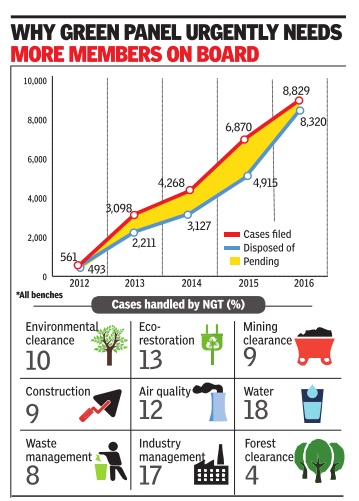National Green Tribunal
This is a collection of articles archived for the excellence of their content. |
Personnel issues
2017/ Understaffed
Jayashree Nandi, Plenty of cases, but not enough staff for NGT, May 2, 2017: The Times of India

The National Green Tribunal (NGT), which is hearing matters of national importance like the restoration of Ganga and Yamuna, is facing a severe manpower crunch. Many important cases are getting delayed or not being taken up at all because the tribunal doesn't have enough judicial and expert members to resolve these matters. NGT has been running on an inadequate staff strength since its inception in 2012. However, the number of cases being handled by it increased from 561 in 2012 to 8,829 in 2016.
Recently , more than one lakh cases of industrial pollution in Tamil Nadu were transferred to NGT by the Madras high court after it dissolved the Loss of Ecology Authority , which was considering appeals for compensation by affected farmers in the Noyyal and Amravati regions. NGT, however, will not be able to take up these matters because it doesn't have the required manpower to hear them.
At present, the green court has seven judicial members and seven experts while it requires 20 in each segment, sources said. A judicial member can be anyone who is or has been a Supreme Court judge, an HC chief justice or an HC judge while an expert member is a technical expert in any aspect of environment. These members are appointed by the ministry of environment.
The NGT Act, 2010, says at no time, the tribunal will have less than 10 judicial and expert members. The same judicial and expert members are handling cases of different zones. For example, Ajay Deshpande from NGT's western bench in Pune has expertise in river and air pollution.He is brought to Delhi to hear the Ganga case but at the same time, he is handling matters in the western bench.As a result, the environmen tal clearance to the Mopa airport in Goa is getting delayed.
Usually in “part-heard“ matters, the composition of judges and expert members is to be maintained till the end because they are aware of the case history. Similarly, in the eastern bench in Kolkata, river expert member P C Mishra -who was hearing crucial cases such as opposition to the Mapithel dam in Manipur, environmental impact of the Lower Subansiri hydroelectric project dam in Arunachal Pradesh and the Teesta IV hydroelectric project in Sikkim -has been moved to another bench in Pune. These part-heard cases in the Kolkata bench are getting delayed due to absence of the same composition of judges and expert members. “The ministry talks about speedy clearances and justice, then why isn't it providing NGT with adequate staff,“ asks environmental lawyer Ritwick Dutta.
NGT has written to the environment ministry more than once for expediting appointments, but hasn't received a response. “The environment ministry is our governing body and the NGT Act clearly lays down that the ministry will make these appointments. So, we have no option but to wait. We have stopped our circuit benches in Shillong, Jodhpur and Kochi; instead they are being heard in Delhi,“ said an NGT office-bearer who does not wish to be identified.
A ministry official told TOI that NGT “was are running at 70% capacity . They need a total of 10 in each category ...We advertised for some of these positions a couple of months ago, but didn't get enough applications. The deadline for applications expired yesterday“.